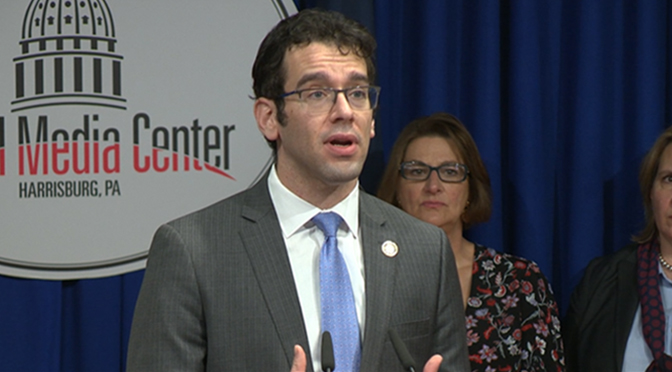HARRISBURG, Jan. 14 – State Rep. Mike Schlossberg, D-Lehigh, was joined by members of the Pennsylvania House Mental Health Caucus and members of Gov. Tom Wolf’s administration at a news conference today outlining the initial report of the Pennsylvania Suicide Prevention Task Force.
The work of the Suicide Prevention Task Force is a complement to the goals and strategies surrounding the governor’s Reach Out PA: Your Mental Health Matters initiative announced earlier this month.
Schlossberg, co-chair of the Pennsylvania House Mental Health Caucus, said the task force conducted 10 public listening sessions hosted throughout Pennsylvania.
“We need to study all factors that lead to suicide because treating the disease is both challenging and difficult,” Schlossberg said. “I was floored to hear so many personal stories of how family members said they wish they would have identified the signs before their loved ones took their own lives.”
The task force identified the following themes in their preliminary report:
- Reduce the stigma associated with mental health, suicide and suicide attempts, which can affect people getting help.
- Resources are needed to elevate mental health as a public health issue, incentivize the integration of physical and behavioral health, and improve suicide prevention at the local level.
- Barriers exist to treatment such as cost and insurance gaps.
- Access to more detailed suicide and suicide-attempt data is needed to help policymakers make meaningful decisions.
- Addressing issues within the mental-health workforce, such as pay and barriers to entry, can improve quality of care.
- Proper resources are needed in Pennsylvania schools.
- The legislature could take direct action to prevent suicides by passing a Red Flag Law to remove access to firearms by people at risk for suicide.
In 2019, a bipartisan group of the Pennsylvania House Mental Health Caucus sent a letter to Wolf urging him to restore funding cuts made a decade ago in order to bolster mental health service programs in Pennsylvania.
The 2012-13 budget resulted in funding for health and health services being cut by 10%, forcing counties to reallocate funding for mental health to other equally important services. This has hindered the delivery of quality community-based mental health services and destabilized people’s chances for recovery. These cuts led to:
- A reduction or elimination of mental health employment, education and/or training programs.
- Reductions to community housing and residential programs.
- A reduction in funding for psychiatric rehabilitation services.
- Funding cuts or an elimination of drop-in centers, clubhouses and warm lines.
- An exacerbation of the health and human service workforce crisis at all levels. Providers continue to have issues recruiting/retaining health and human service professionals and critically needed front-line staff.
The letter urges Wolf to increase mental health funding to restore the 10% cut and provide a 5% increase in the 2020-21 budget, and a commitment for an additional 5% increase in the 2021-22 budget. It notes strong support for the increases from county commissioners across the commonwealth and the dire concerns of mental health service providers who are struggling to deliver care to some of Pennsylvania’s most vulnerable populations.
Information provided to TVL by:
Roseann Cadau
House Democratic Communications Office
-AMAZONPOLLY-ONLYWORDS-START-
-AMAZONPOLLY-ONLYWORDS-END-






